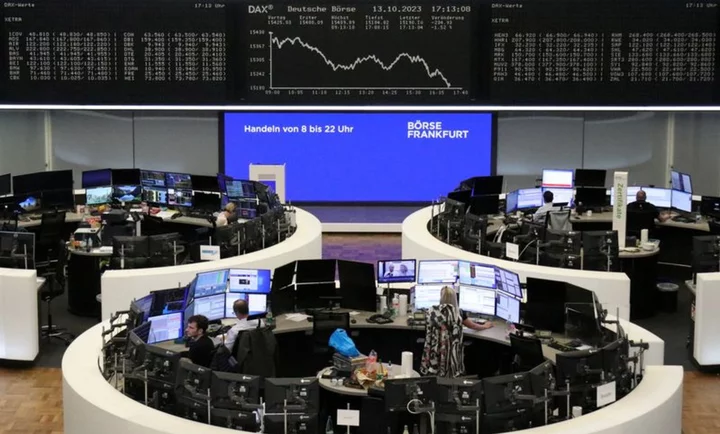By Elizabeth Howcroft
LONDON Markets showed signs of a slight recovery in sentiment on Monday, as European stock indexes edged up and oil prices steadied, but traders were still cautiously watching for any signs of escalation in the Israel-Hamas war.
Israel's Prime Minister Benjamin Netanyahu vowed on Sunday to "demolish Hamas" as his troops prepared to move into the Gaza Strip in pursuit of Hamas militants whose deadly rampage on Oct. 7 killed 1,300 people in the worst attack on civilians in Israel's history.
Oil prices rose last week as investors priced in the chance of escalation in the world's top oil-producing region, while U.S. Treasuries and gold prices rose as traders bought safe-haven assets.
Traders are waiting to see if the conflict draws in other countries, which would drive up oil prices further and deal a fresh blow to the global economy.
They are keeping a particular eye on Iran, which said on Sunday that its armed forces would not engage militarily with Israel so long as Israel does not attack it, its interests or its citizens.
At 1120 GMT, the MSCI World Equity Index was down 0.1% on the day. Europe's stock indexes rose, with the STOXX 600 up 0.2% and London's FTSE 100 up 0.4%.
Oil prices eased but were still above $90 a barrel after surging last week.
The outlook for Wall Street looked uncertain, with Nasdaq futures flat and S&P 500 futures up 0.3%.
"What the market will be looking for in order for the mood to improve would be any sort of de-escalation ... and on the downside any sense that the oil-rich nations are going to be involved would be a catalyst to drive stocks lower," said Fiona Cincotta, senior markets analyst at City Index.
"Any further comments from Iran will be much in focus."
Top U.S. officials warned on Sunday that the war could escalate into a wider conflict across the Middle East.
U.S. Secretary of State Antony Blinken arrived in Israel on Thursday and has also been to Qatar, Jordan, Bahrain, United Arab Emirates, Saudi Arabia and Egypt in a bid to limit the spread of the conflict.
Before Hamas' attack, market sentiment had been driven by the global economy and the idea that the U.S. Federal Reserve was planning to keep rates higher for longer.
This narrative, along with company earnings this week, has become secondary to the geopolitical concerns, Cincotta said.
Benchmark 10-year U.S. Treasury yields edged up to 4.7018%, following a more than 8 basis point decline on Friday amid demand for the safety of bonds.
European government bond yields rose after European Central Bank officials reiterated concerns about inflation. The German 10-year yield was up 6 basis points at 2.788%.
The U.S. dollar index slipped slightly, down 0.1% on the day at 106.470. The euro was up 0.2% at $1.053.
Israel's shekel sank to a more than eight-year low.
Gold pared some of Friday's $63 gain, retreating 0.9% to $1,914.7 per ounce.
"Ultimately, gold and oil prices are the most sensitive expressions of the (Gaza) conflict's risks," Kyle Rodda, senior financial market analyst at Capital.com, wrote in a note.
However, "identifying the potential flashpoints and gaming-out scenarios is highly challenging", Rodda said.
(Reporting by Elizabeth Howcroft in London, additional reporting by Kevin Buckland in Tokyo; editing by David Evans and Jan Harvey)

